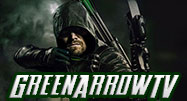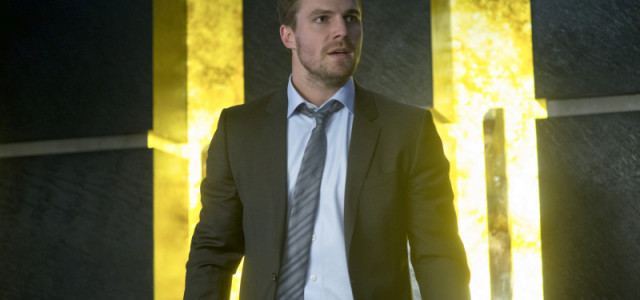
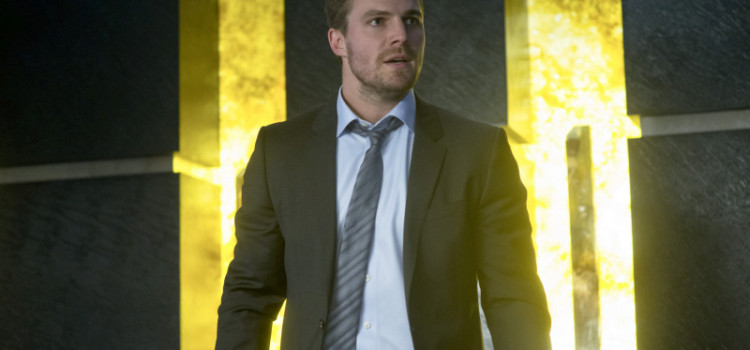
Arrow #2.18 “Deathstroke” Recap & Review
Recaps & Reviews April 5, 2014 Derek B. Gayle

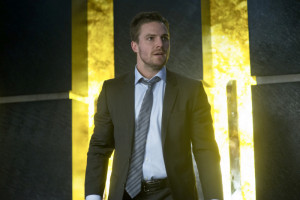 Summary: A non-stop thriller of an episode reveals the extent of Slade’s machinations and the characters’ interconnectedness, then exposes this season’s thesis and subsequently turns it on its head.
Summary: A non-stop thriller of an episode reveals the extent of Slade’s machinations and the characters’ interconnectedness, then exposes this season’s thesis and subsequently turns it on its head.
If you have not seen this episode yet and do not wish to be spoiled, do not continue reading!
Recap
Picking up after last week’s cliffhanger, Slade holds Thea hostage, and publicly announces her captivity at Moira’s debate. Moira believes Malcolm to be responsible, but keeps quiet about her suspicions. Oliver knows it’s Slade, however, and preps Team Arrow to take him down. The whole team goes in full-force, but instead of taking him out, Oliver has Sara use a paralyzing venom from the League of Assassins to suppress him and let the police take him in, against Roy’s better judgement. Slade has covered his tracks well, however, and there police release him since there’s nothing linking him to Thea. The team tries to track him but loses him, angering Roy so much that he quits Team Arrow, citing Oliver’s incompetence. During the crisis, Oliver signs temporary leadership of the company to Isabel to take care of a major vote, only for her to turn the tables and call the board to vote Oliver out and vote her in permanently. After a comment about his nightlife, Oliver realizes that Isabel is working with Slade, and the two duke it out. She tells him where Thea is being held, but it all turns out to be a trap—while he’s busy trying to rescue her, Slade hijacks a transport of Starling prisoners, and inducts them into his army. Thea gets out on her own, and reveals that Slade told her Oliver’s secret—that he knew Malcolm Merlyn was her father all along. Thea does tell the cops that Slade Wilson was her abductor, but Quentin is still arrested for working with the vigilante to bring him in and not revealing the Arrow’s identity. Roy leaves Starling City completely. Slade shows up at Laurel’s apartment and flat out tells her that Oliver is the Arrow.
Review
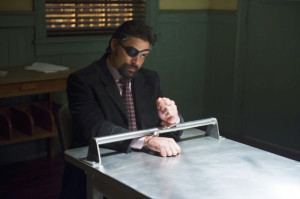 Slade Wilson is the villain of the story, and Oliver Queen is the hero.
Slade Wilson is the villain of the story, and Oliver Queen is the hero.
That’s about the most blatantly obvious thing that could be said about Arrow at this point, but that idea is also a key to understanding just what this season has been doing since the premiere. One of season 2’s questionable moves, which we’ve addressed before, was just how many sprawling, unrelated threads have been strewn about. “Deathstroke,” both the episode and the character from which it takes its namesake, continually ties together these threads, either bringing them to a natural climax or simply justifying their earlier inclusion. “Suicide Squad” tied some dangling bits with Diggle and A.R.G.U.S. into the Deathstroke story, for example. But “Deathstroke” finds a way to bring in literally everyone else from the show’s main cast.
The most obvious is finding a place for Thea in this place’s story, outside of being a personified motivation for Roy. Willa Holland is quite brilliant in the episode, straying far from the stereotypical teen girl horror victim (think of how much more she’d have screamed and cried on just about any other show or movie!) and playing Thea with the strength she’s earned throughout the show. When Slade reveals he’s not taking Thea home, for example, Holland hilariously plays her reaction as an annoyed “Really? Today, of all days?!” More importantly, it ties into the fantastic misdirect the episode pulls on us—teasing that Thea would learn Oliver is the Arrow, instead revealing that Malcolm is her father, and then still revealing that Oliver is the Arrow but to Laurel—effectively letting Slade (and the show) have their cake and eat it too, but it in the best possible way. Not only do we see a glimpse of Slade’s ruthlessness, but Thea also has new and potentially darker woman scorned direction to go into.
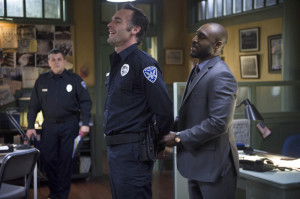 Hopefully that angle plays out better than it did for Laurel, who may still be on it given her perplexing “embracing darkness” development last week. Time will tell what will happen now that she knows the truth, but it’s one of the only less-certain elements of this week’s reveals. The potential problem is the weird trajectory she’s been on all season and if this was the right timing for her. It’s perfect for ending an episode about how far Slade will go to give Oliver a “distraction,” as he calls it. But we’ve already seen Laurel hate the Arrow and then get over it, hate her sister and then get over it, and hate herself and (maybe) get over it. It’s hard to see where learning Oliver’s secret fits in now for Laurel as a character, though it could conversely be the answer to the show’s Laurel problems once and for all.
Hopefully that angle plays out better than it did for Laurel, who may still be on it given her perplexing “embracing darkness” development last week. Time will tell what will happen now that she knows the truth, but it’s one of the only less-certain elements of this week’s reveals. The potential problem is the weird trajectory she’s been on all season and if this was the right timing for her. It’s perfect for ending an episode about how far Slade will go to give Oliver a “distraction,” as he calls it. But we’ve already seen Laurel hate the Arrow and then get over it, hate her sister and then get over it, and hate herself and (maybe) get over it. It’s hard to see where learning Oliver’s secret fits in now for Laurel as a character, though it could conversely be the answer to the show’s Laurel problems once and for all.
The rest of the Lances also play a role, of course. Sara’s initial inclusion in this season’s story is more justified, with Slade’s ultimatums in the flashback being a prime factor in pushing her down the slippery slope into darkness she’s been fighting to get out of. Her inclusion has in turn tied Quentin and Laurel into the main stories by association, and Sebastian Blood’s initial interest in the latter make more sense knowing Slade surely has an interest in hurting Sara and her family. Quentin gets the short shrift, with an arrest that’s admittedly a bit inexplicable, but certainly earned. Chances are his arrest will be a key factor in how Laurel takes the news about Oliver, and Quentin’s own faith in the Arrow will surely be tested after the ordeal.
Of course, we’ve already seen Roy’s faith tested time and time again this season, and it’s ironic that the episode which has him exit Team Arrow also has him as the greatest voice of reason. He’s not wrong: Oliver has been contradictory and his decisions have led to lots of problems. Thea’s abduction and Slade’s escape is simply the culmination of it all. Roy’s big breakdown works because Team Arrow really is blindly following Oliver to hell and back, Roy just doesn’t fully understand what that means. They have to be able to have faith in Oliver as a leader for the team to work, which Diggle and Felicity both spent most of season one learning. But Roy has only seen things get worse since his induction in “Tremors.” As he sees it, Diggle yells at him for being out of line because Oliver is their unquestionable god, and Sara would of course defend him since she’s “screwing him.” Roy suffered a serious case of hero worship early in the show, an in a classic case of “never meet your heroes,” it’s been shattered by the dysfunction he’s seen. That makes his disillusionment even worse when the one person Oliver was supposedly helping him protect gets caught in the crossfire anyway, which makes it all the more brilliant to have the episode hinge of an abduction that touches so many people.
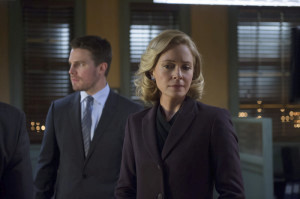 Thea’s abduction also gives Malcolm Merlyn’s brief return early in the season a less direct tie to the main story. Particularly, it gives Moira a reason to repent throughout Slade’s machinations, while still keeping her the ambiguous character we’ve grown to love (hate?) throughout the show. The scene which Moira and Oliver finally talk about their issues during the crisis is a beautiful one; well-staged, well-acted by Susanna Thompson and Stephen Amell, and with a gorgeous musical score. But as much as it’s presented as a warm, earned resolution to their conflict, it’s a resolution still built on lies and ambiguous intentions. Moira may be genuinely repentant at her actions in the past, but she’s still—perhaps unknowingly at this point—toying with Oliver for her own gain. The major surprise for her repentance and guilt from his point of view is that she feels responsible for Thea’s abduction when he knows for a fact that she’s not. It’d be a typical “see the light” kind of moment for a drama, where a time of crisis exposes a character for who they truly are, and to Oliver she’s repenting out of pure guilt for everything. In reality, Moira does have a specific secret that could have very well been the reason Thea was abducted, and she still doesn’t reveal it to Oliver or anyone. Perhaps she felt revealing Malcolm could be responsible would be moot—after all, if he was able to escape Ra’s al Ghul, then perhaps he’d be too powerful for anyone to catch this time around—but it still points to Moira clutching to that one last secret, the one last thing that can make her feel like she actually has the power to protect her children and herself. If anything, she’s still lying to herself…but in doing so, she indirectly gets Oliver back on her side through a power play, even an unintentional one. The tragedy in all this is that this moment, which should be a happy one for Oliver and Moira, will come back to bite her when the truth about Malcolm inevitably comes out.
Thea’s abduction also gives Malcolm Merlyn’s brief return early in the season a less direct tie to the main story. Particularly, it gives Moira a reason to repent throughout Slade’s machinations, while still keeping her the ambiguous character we’ve grown to love (hate?) throughout the show. The scene which Moira and Oliver finally talk about their issues during the crisis is a beautiful one; well-staged, well-acted by Susanna Thompson and Stephen Amell, and with a gorgeous musical score. But as much as it’s presented as a warm, earned resolution to their conflict, it’s a resolution still built on lies and ambiguous intentions. Moira may be genuinely repentant at her actions in the past, but she’s still—perhaps unknowingly at this point—toying with Oliver for her own gain. The major surprise for her repentance and guilt from his point of view is that she feels responsible for Thea’s abduction when he knows for a fact that she’s not. It’d be a typical “see the light” kind of moment for a drama, where a time of crisis exposes a character for who they truly are, and to Oliver she’s repenting out of pure guilt for everything. In reality, Moira does have a specific secret that could have very well been the reason Thea was abducted, and she still doesn’t reveal it to Oliver or anyone. Perhaps she felt revealing Malcolm could be responsible would be moot—after all, if he was able to escape Ra’s al Ghul, then perhaps he’d be too powerful for anyone to catch this time around—but it still points to Moira clutching to that one last secret, the one last thing that can make her feel like she actually has the power to protect her children and herself. If anything, she’s still lying to herself…but in doing so, she indirectly gets Oliver back on her side through a power play, even an unintentional one. The tragedy in all this is that this moment, which should be a happy one for Oliver and Moira, will come back to bite her when the truth about Malcolm inevitably comes out.
Isabel Rochev, who never seemed to fit the season very well and often felt like Summer Glau wasn’t right for the role, is revealed to be all part of Slade’s master plan, too. For one thing, Summer Glau kicking ass pretty much justifies Glau having been cast in the first place. But while it’s not the cleverest of moves in the grand scheme of things, there’s lots of merit to the longevity of the twist. We all knew something was up with Isabel from her first appearance and her non-reaction to the events of “Keep Your Enemies Closer,” but it’s been so long since she played a part—her last appearance was way back in “The Scientist”—that enough distractions made her easy to forget. Her reappearance here initially builds on development from “Keep Your Enemies Closer” as her antagonism with Oliver subsided, and she comes off as a surprisingly likeable, understanding character. All of which, we learn, are completely false. It’s not enough to make her reveal feel like a total betrayal on its own since suspicion has always been there, but confirming it during one of the tensest hours the show has put out makes Oliver’s anger more raw.
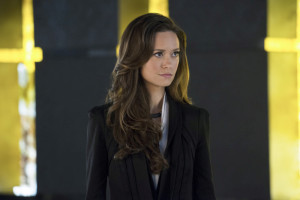 Everything this week is emotionally raw, which makes it all the worse when Slade points to all of these carefully plotted machinations as merely distractions. At the end of the day, Slade just wants to make an army of Mirakuru soldiers, but that simple plan has managed to touch literally every important character on this show. It’s amazing how thoroughly entwined the characters have all become now, but in a way that’s something of an antithesis of the Lost-style of character connections that have since become so prevalent. The characters aren’t “fated” to run into each other or (Thea/Malcolm aside) are all “shockingly” revealed to be related to one another—looking at you, Once Upon a Time—it’s thanks to human machinations. These people are forced together through calculated events and plans, which makes the characters in charge all-the-more powerful and the writing behind it more competent (saying “it’s fate” is a bit cheap, after all.) That’s one major element that’s kept Arrow so entertaining at this stage, ensuring that any decision any character makes, big or small, has a ripple effect all the way up to the top. Joanna returning and getting a cup of coffee could get a member of Team Arrow killed and resurrect Count Vertigo as part of Slade’s machinations, and there’d probably be a way to believably justify it at this point. It’s hard to predict what’s coming, but whatever it is keeps coming up impeccably well-planned. Or if it isn’t, it certainly feels like it. In season 2’s case, Slade’s behind it all. So through all that, we know for sure: Slade Wilson is the villain of the story. Not that it was a question, but it was an idea that we’ve seen unfold and touch literally every main character and element of the show.
Everything this week is emotionally raw, which makes it all the worse when Slade points to all of these carefully plotted machinations as merely distractions. At the end of the day, Slade just wants to make an army of Mirakuru soldiers, but that simple plan has managed to touch literally every important character on this show. It’s amazing how thoroughly entwined the characters have all become now, but in a way that’s something of an antithesis of the Lost-style of character connections that have since become so prevalent. The characters aren’t “fated” to run into each other or (Thea/Malcolm aside) are all “shockingly” revealed to be related to one another—looking at you, Once Upon a Time—it’s thanks to human machinations. These people are forced together through calculated events and plans, which makes the characters in charge all-the-more powerful and the writing behind it more competent (saying “it’s fate” is a bit cheap, after all.) That’s one major element that’s kept Arrow so entertaining at this stage, ensuring that any decision any character makes, big or small, has a ripple effect all the way up to the top. Joanna returning and getting a cup of coffee could get a member of Team Arrow killed and resurrect Count Vertigo as part of Slade’s machinations, and there’d probably be a way to believably justify it at this point. It’s hard to predict what’s coming, but whatever it is keeps coming up impeccably well-planned. Or if it isn’t, it certainly feels like it. In season 2’s case, Slade’s behind it all. So through all that, we know for sure: Slade Wilson is the villain of the story. Not that it was a question, but it was an idea that we’ve seen unfold and touch literally every main character and element of the show.
However, one piece of the statement remains: Slade Wilson is the villain, but Oliver Queen is the hero. Except, as this episode outright states via Roy, Oliver screws up a lot. We’ve mentioned in the past that a great accomplishment of Arrow has been to let Oliver make lots of stupid mistakes and bad decisions while still getting us to root for him. But “Deathstroke,” and really this back half of the season as a whole, is out to challenge that notion in-universe, making it apparent to the people around Oliver that their faith in him is misplaced. Thea and Laurel have no reason to believe Slade Wilson, but their belief that Oliver is a good person has been shaky at best since the show started. Realizing their instincts were right and Oliver really is a bad guy, in some way, is surely a source of catharsis as much as it is a point of anger or confusion. Katie Cassidy’s portrayal of Laurel’s reaction, for example, isn’t about the shock so much as all the truths and what they mean for herself, her sister, her father and Tommy rushing back to her. Things suddenly make sense, but in the worst possible way. But more importantly, it’s a total inversion of what was built up about Oliver in episodes like “City of Heroes” and “Three Ghosts,” and as a result he’s falling even harder now that he’s losing grip on the hero he was so close to becoming. Amell plays an unhinged Oliver that has steadily cracked more and more since the return of Mirakuru and then Slade himself, collapsing under the weight of obsession and fear. It’s sad to watch, but it’s incredibly engaging.
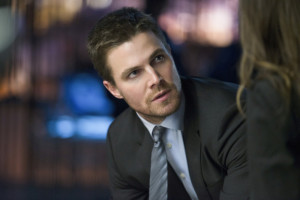 Season one Oliver worked to build and rebuild his relationships for the sake of his missions and sanity, and if Slade had intervened at that stage, he’d merely be driving Oliver back to the heartless machine he was in the early episodes of the show. The difference now is that Oliver has gotten a taste of true humanity and a better understanding of doing good, and has tried to project that on the people around him. He isn’t trying to get people on his side because he wants to be better at saving the day, he’s doing it because he honestly believes he’s doing the right thing and wants to make people’s lives better. He wanted to save his father’s company, even if he’s a terrible CEO. He wanted to keep Thea blissfully ignorant, even if it meant keeping another secret. He (apparently) thought his mother would make a good mayor, and supported her political campaign against his better judgement. He took Roy in as his charge, even if he didn’t quite know how to train him. He brought Quentin Lance to his side, even though keeping his identity secret put Lance at risk. He wanted to keep everyone in the dark about his alter ego unless the circumstances were absolutely dire, because “the last guy who learned got struck by lightning.” Unlike many characters’ motivations, and even his own motivations a year ago, Oliver truly has the best intentions. But those are what the road to hell are paved with…and in “Deathstroke,” every single one of these intentions are twisted into pressure points that Oliver himself has or is on the verge of setting off. Slade Wilson is definitely the villain of the story, but it’s up in the air whether or not Oliver will still be the hero, to himself and to everyone around him.
Season one Oliver worked to build and rebuild his relationships for the sake of his missions and sanity, and if Slade had intervened at that stage, he’d merely be driving Oliver back to the heartless machine he was in the early episodes of the show. The difference now is that Oliver has gotten a taste of true humanity and a better understanding of doing good, and has tried to project that on the people around him. He isn’t trying to get people on his side because he wants to be better at saving the day, he’s doing it because he honestly believes he’s doing the right thing and wants to make people’s lives better. He wanted to save his father’s company, even if he’s a terrible CEO. He wanted to keep Thea blissfully ignorant, even if it meant keeping another secret. He (apparently) thought his mother would make a good mayor, and supported her political campaign against his better judgement. He took Roy in as his charge, even if he didn’t quite know how to train him. He brought Quentin Lance to his side, even though keeping his identity secret put Lance at risk. He wanted to keep everyone in the dark about his alter ego unless the circumstances were absolutely dire, because “the last guy who learned got struck by lightning.” Unlike many characters’ motivations, and even his own motivations a year ago, Oliver truly has the best intentions. But those are what the road to hell are paved with…and in “Deathstroke,” every single one of these intentions are twisted into pressure points that Oliver himself has or is on the verge of setting off. Slade Wilson is definitely the villain of the story, but it’s up in the air whether or not Oliver will still be the hero, to himself and to everyone around him.
Odds & Ends
- An important point that didn’t quite fit into the review: Slade sees Shado’s “ghost” just like Oliver has. But, like it was implied in “Three Ghosts,” these ghosts are purely psychological, and in Shado’s case, are projections of what Oliver and Slade see in themselves. Oliver wants to believe in the best in people and in himself, and thus sees a loving, angelic Shado. Slade is fueled by rage and hatred, and in turn sees her as a vengeful spirit. Very interesting.
- If there’s one problem with Slade’s plans, it’s his choice to expose himself as Thea’s captor. After all, he could have easily been in his Deathstroke outfit instead of Mr. Wilson the whole time, right? It seems like a dumb move because it immediately restricts a lot of his mobility and corporate power, but it also teases that his plan is so well-thought-out that he knows he won’t need that wiggle room from here on out. That’s even scarier.
- The Thea/Laurel secret bait-and-switch was great, but it’s worth acknowledging the other great one of the episode: the contrasting suit-up sequences for Oliver and Slade building up their confrontation, which never happens. When Thea is rescued, Amell plays Oliver less relieved and more disappointed that they didn’t get to have their final battle.
- Amell is particularly good in his big blow-up in the Arrowcave where he’s determined to go after Slade alone. Even better, after Diggle and Sara try to convince him not to go, Felicity tells him to “end it.” What a phenomenal scene.
- Manu Bennett does his usual evil Slade sneering and what I’ve coined “whisper-growling,” but he’s particularly good in his scenes with the captive Thea. “Go ahead and finish that sentence, I’m curious to see what kind of threat a nineteen year old girl can make.”
- They’ve called attention to Slade’s eye not regenerating, so we know it’s not an oversight. We’ll see if it’s explained, or if it remains a funny little “Mirakuru is mysterious!” non-answer.
- Is this the first time we learned Quentin’s middle name is Larry?
- Biggest, cheapest, guiltiest laugh of the episode: Slade Wilson saying, “I’m not one to hold a grudge.”
- “Do you remember where you put your business suit? Or do you keep that in a cool glass case too.”
- “The NSA’s right, it’s a lot easier when you don’t need a warrant.”
A SECOND OPINION
by Matt Tucker
This might, perhaps, be my briefest review because there weren’t a significant amount of events that took place in the hour. That said, each event that took place was extremely significant.
You know you were expecting it. A confrontation, a beatdown, some kind of physical collision between Slade and Oliver. Yet, you were duped. We were all duped, but duped for something far better. “Deathstroke” proved to the best of chess matches, with Slade demonstrating the far better advantage.
At every turn, Team Arrow, and specifically Oliver, was bested. Slade foiled Felicity’s attempt to track him. His capture of Thea not only primed Roy’s anger, but he was able to leverage that to force the wedge between Roy and Oliver. That abduction also proves to be much more chess move than something gruesome, and an insidious one at that. Even in the island timeline, Slade was able to out-think Sara and Anatoli’s plan, revealing even further elements of the Mirakuru (super senses). In ways far more devious than anything Malcolm Merlyn had planned last year, Slade proves he is in complete control.
Just how thoroughly he’s played Oliver the entire season came to light, particularly in the Isabel Rochev reveal. Sure, it was telegraphed what was going to happen the moment Oliver furiously signed his CEO duties over to Isabel, but that didn’t diminish the sting of the moment she let him know he knew his secret. Suddenly, the Russian trip in “Keep Your Enemies Closer” makes more sense, as it always seemed weird that Isabel wasn’t asking more questions. And the line about the sins of the father perfectly played on that bit of trivia that Isabel’s name was on Robert Queen’s list.
What really sealed the effectiveness of the episode was that moment where a listless Oliver slumped against the workbench in the Arrowcave and admitted to Diggle and Felicity — subtle, powerful way of showing Oliver stripped down to his essentials by not having Sara and Roy in the cave at that moment — that Slade was in his head and knew every move to get to him. Just like the quiet exchange between Oliver and Helena in last week’s “Birds of Prey,” Amell plays the emotional beat exceptionally well, really driving home just how real the threat is and how affected he is by every move Slade has made this year. There’s a similar moment between Amell and Susanna Thompson as Oliver and Moira reconnect over Thea’s abduction.
The haunting of Slade by Shado, dementing his perception of the world and of her, was chilling in a way far different from Oliver’s visions of her. It was an unexpected and nice touch to include her, even in the moments where she’s just standing in the background. And just as the clever way of having Slade touch everything in “The Promise,” it visually intensified his danger. He’s scarier because he seems quite capable, present, and collected in a way far different from the distraught and nigh-foaming version from the island timeline. Yet, this solidifies that the madness caused by the Mirakuru has never gone away, which makes the final act of the season open to unpredictability.
This all culminates in a brilliant setpiece where the Arrow storms the warehouse we’d previously seen Thea held, and while it should’ve been expected that she wouldn’t be there, it honestly came as a surprise. It set up the idea that Slade revealed to Thea that her brother was the Arrow and had no unleashed her back into Oliver’s world, their world. To be honest, it was a bit deflating when Thea revealed she learned about her true parentage, though it was valiant of Oliver to stand up for his mother and take the blame on himself, even though he’d only just found out months ago.
Unfortunately, that left the reveal of Oliver’s secret identity to Laurel at the end of the episode a bit anti-climactic. It’s certainly a gamechanger as far as the series goes, with Laurel no doubt soon to come to the conclusion that the Canary is Sara, as well. Though there’s sure to be some predictable anger now that she knows the truth, specifically regarding Tommy, even though she’d already forgiven the vigilante for his death, this sets up the potential for interesting response from her through the final act of the season. That, in and of itself, is exciting, as is the prospect of QC’s Applied Sciences outfitting Slade’s newly acquired army of thugs and reprobates. (Ironically, we spoke about the possibility that Applied Sciences would be used to somehow create superpowers last season while speculating what terrible event was planned for the finale before we’d learned about the Undertaking.) It’s all brilliant gamesmanship on the one-eyed man’s part.
Mentioned last week was a common complaint in the viewership that this season had too many people and too many moving parts, that somehow it had lost its way. This season, though, has always been about Slade vs. Oliver. “Deathstroke” made clear that every single plot — perhaps even Waller and her A.R.G.U.S. stuff — has been related to and completely in service of that concept. This wasn’t the first showdown episode that was expected, but what we got was so much more.
